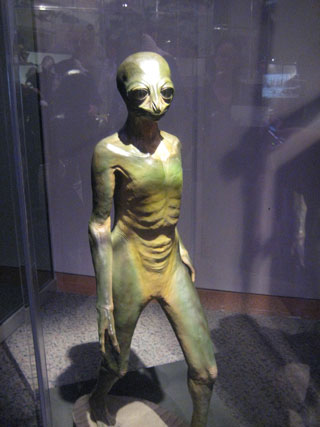I received my first shot of the Pfizer vaccine a week ago, as Connecticut expands its rollout strategy in a race against the variants beginning to circulate in the state. The process was efficient and deeply weird, if I’m being honest.
On an overcast and chilly morning, I drove to a parking garage, left my car, and walked down a narrow and deserted alleyway, as if I was trying to score drugs (which in a way was true.) A local playhouse had been commandeered to serve as a vaccine distribution center. Checking in at the front desk, I was handed a blue card and sent down a flight of stairs to an airy room filled with kiosks. There, I traded my blue card for a white vaccine record card, and rolled up my sleeve for a volunteer fireman to give me my first dose (he was better than a few nurses who’ve stuck needles in me). Then I was ushered into a theater, where I was able to book my second appointment while a massive overhead screen displayed the time so I’d know when the requisite 15 minutes had passed until I could leave. No side effects for Shot #1, aside from a sore arm.
Mine seems to be a fairly ubiquitous experience, though several people I know were able to obtain their shots via drive-thru. Our New Normal certainly feels strange. Then again, our Old Normal felt strange, too; throughout my life, I’ve experienced a persistent, low frequency hum of the so-called commonplace registering as inexplicably surreal. It was years before I learned there is actually a name for this: the Mooreeffoc effect.
I was driving home after getting my shot when a friend called and asked if I had heard of the Silurian Hypothesis and, if so, what my opinion on it was. Turns out that I had done more than hear about it: I had written a piece for Strange Horizons nine years before Schmidt and Frank wrote their paper on the same subject. My article is “Was There Ever a Dinosaur Civilization?”, and it takes a wider approach than the Silurian Hypothesis (which hinges on the idea that there were might have been pre-human civilizations of sufficient advancement that they were burning fossil fuels.)
To be clear, I don’t believe there were any civilizations on Earth before the rise of Homo sapiens; I remain an ardent scientific rationalist and skeptic. Sometimes it’s fun to entertain thought experiments, however, so here it is: in the 3.5 billion years that life has been on Earth, if an ancient pre-human civilization had existed, would it leave any evidence behind that could be found millions of years later? Conversely, what evidence of our own civilization might last millions of years into the future (spoiler alert: nearly all traces of us would vanish in a few thousand years, let alone a few million.) I cover quite a bit of ground, from avian intelligence to non-human tool-use (like crows fashioning hooks out of leaves to “fish” for termites), and the low probability of finding fossils to begin with.
Whether or not civilization-capable intelligence is within the parameters of dinosaur design (and again, it is most assuredly not in any known example) isn’t the real question, however. Our fossil record is woefully incomplete. The troodon line had large brains relative to their body mass, dexterous arms, and quasi-opposable thumbs; if a crow can go fishing with its feet, is it out of the question for an unknown specimen of the troodon grouping to have learned to use spears? Life on this planet has been around for a very long time. Dinosaurs reigned supreme for 160 million years, the unquestionable masters of the planet and great success story of evolution.
More probable, I would say, is the notion that some Stone Age stirrings may have occurred millions of years later (but still millions of years before modern humans). Homo erectus was using tools… more than two million years ago. Could they have managed to create simple villages and rudimentary agriculture?
Thought experiments can be rewarding, at any rate.
Writing can also be rewarding: I’ve made two major sales that I can’t formally announce yet due to contractual considerations. One happens to loosely tie in with the subject of this post, while the other is an alternate history novelette. Next month I should be able to say more.
And–bringing things full circle–next month the majority of my friends and family will be fully vaccinated, too. Looking forward to a reasonable emergence from quarantine into whatever the Next Normal is.

